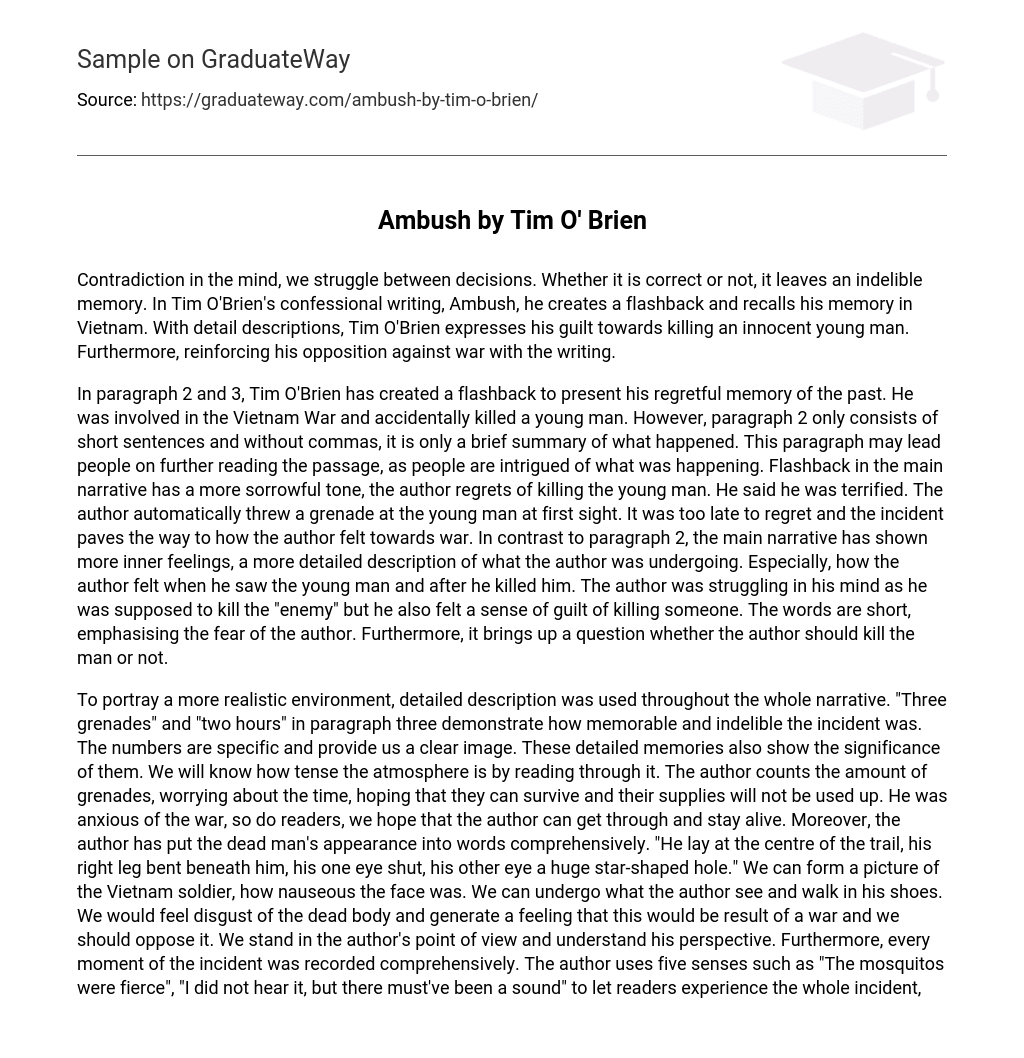Contradiction in the mind, we struggle between decisions. Whether it is correct or not, it leaves an indelible memory. In Tim O’Brien’s confessional writing, Ambush, he creates a flashback and recalls his memory in Vietnam. With detail descriptions, Tim O’Brien expresses his guilt towards killing an innocent young man. Furthermore, reinforcing his opposition against war with the writing.
In paragraph 2 and 3, Tim O’Brien has created a flashback to present his regretful memory of the past. He was involved in the Vietnam War and accidentally killed a young man. However, paragraph 2 only consists of short sentences and without commas, it is only a brief summary of what happened. This paragraph may lead people on further reading the passage, as people are intrigued of what was happening. Flashback in the main narrative has a more sorrowful tone, the author regrets of killing the young man. He said he was terrified. The author automatically threw a grenade at the young man at first sight. It was too late to regret and the incident paves the way to how the author felt towards war. In contrast to paragraph 2, the main narrative has shown more inner feelings, a more detailed description of what the author was undergoing. Especially, how the author felt when he saw the young man and after he killed him. The author was struggling in his mind as he was supposed to kill the “enemy” but he also felt a sense of guilt of killing someone. The words are short, emphasising the fear of the author. Furthermore, it brings up a question whether the author should kill the man or not.
To portray a more realistic environment, detailed description was used throughout the whole narrative. “Three grenades” and “two hours” in paragraph three demonstrate how memorable and indelible the incident was. The numbers are specific and provide us a clear image. These detailed memories also show the significance of them. We will know how tense the atmosphere is by reading through it. The author counts the amount of grenades, worrying about the time, hoping that they can survive and their supplies will not be used up. He was anxious of the war, so do readers, we hope that the author can get through and stay alive. Moreover, the author has put the dead man’s appearance into words comprehensively. “He lay at the centre of the trail, his right leg bent beneath him, his one eye shut, his other eye a huge star-shaped hole.” We can form a picture of the Vietnam soldier, how nauseous the face was. We can undergo what the author see and walk in his shoes. We would feel disgust of the dead body and generate a feeling that this would be result of a war and we should oppose it. We stand in the author’s point of view and understand his perspective. Furthermore, every moment of the incident was recorded comprehensively. The author uses five senses such as “The mosquitos were fierce”, “I did not hear it, but there must’ve been a sound” to let readers experience the whole incident, as if it was projected in front of them. Not only does the author want us to imagine the environment but also immerse ourselves into his character. In addition, the detailed descriptions reinforce the emotions of the whole story. The incident is memorable, the author recalls of every details of it. It doesn’t come to a surprise that the incident has left a lasting mark in the author’s mind. The author may be a soldier, but he is a human at the same time. He can’t bear killing the young man, it is a everlasting nightmare for him. He feels sinful even though he shouldn’t. That is why the question rises: should he kill the young man? Is war the only solution?
Last but not the least, a symbol and reminder of the incident is repeated throughout Ambush. The fog is the motif that represents the memory of the author, an expression of guilt and culpability. “He was part of the fog” The first impression the author has towards the Vietnam soldier. The fog is misty and he cannot see the man clearly. He does’t know the man or hasn’t seen his face, but he kills the man under stress. It isn’t until the dead man dropped to the floor with a star hole in the eyes that the author feels fear and guilt. Although his comrade keeps on comforting him, his culpability left an utterly indelible mark in his mind. In reality, after the war, every time the author thinks or sees a fog, he relates to the war and brings back the painful memory. Fog triggers his memory and hinders his feeling. Furthermore, fog has another hidden meaning, this is a usage of the ambiguity technique. The author is trying to bring out uncertainty with the fog. It’s opaque, and may not be seen through. And just like the situation the author is facing, to kill or not to kill, uncertainty rises, it is a dilemma. Tim O’Brien is stuck between choices, in doubt whether he should tell the incident to his daughter, whether he should kill the man or not, the contradiction makes him feel unbearably guilty. This is what the author intends to accentuate: war should be discouraged, it is the cause of disaster. The author strongly opposes to war as it only stirs up painful memories and death.
Tim O’Brien expressed his opposition against war in the story with different techniques. The guilt and culpability he feels after killing the Vietnam soldier is evidence of the reluctance of people towards war. No one was willing to participate in the war. They were hesitant in killing their “enemies”, questioning whether this war should even be started. People are in disgust of the war and through “Ambush’, Tim O’Brien is also expressing his disapproval of the war.





